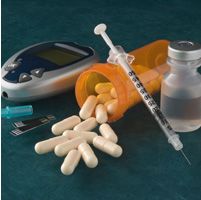Article
The AACE Issues Position Statement on SGLT-2 Inhibitors
Author(s):
Diabetic ketoacidosis (DKA) has generally been associated with type 1 diabetes mellitus (T1DM) and insulin use.

Diabetic ketoacidosis (DKA) has generally been associated with type 1 diabetes mellitus (T1DM) and insulin use. After several reports of DKA occurring in patients treated with sodium glucose-cotransporter 2 (SGLT-2) inhibitor therapies, regulators became concerned that these agents may increase the risk of DKA, especially among patients taking exogenous insulin.
In 2015, the US Food and Drug Administration (FDA) and the European Medicines Agency (EMA) issued safety alerts indicating sodium—glucose cotransporter 2 (SGLT2) inhibitors may increase the risk of diabetic ketoacidosis (DKA) in people with type 2 diabetes (T2DM). In April 2016, the American Association of Clinical Endocrinologists (AACE) and American College of Endocrinology (ACE) issued a joint position statement that responds to these safety alerts.
The AACE/ACE reviewed more than 80 cases in the literature and concluded there was no definitive evidence to suggest that DKA was more likely in T2DM patients now than it was in the years before SGLT2 inhibitors were available.
They reported the majority of cases occurred in people with insulin-deficient diabetes, including T1DM, and latent autoimmune diabetes in adults.
They indicated that one factor that may have confounded the issue was the definitions used.
Many cases of DKA in T2DM patients were in fact cases of ketosis rather than DKA. Furthermore, ketosis — an accumulation of ketones – is not necessarily harmful, and may result from a shift to fat metabolism potentially influenced by SGLT-2 inhibition.
The AACE/ACE position statement suggested that almost all cases of DKA were precipitated by metabolically stressful events (e.g. surgery, extensive exercise, myocardial infarction, stroke, severe infections, prolonged fasting, and other stressful physical and medical conditions).
Members of the AACE/ACE recommended discontinuing SGLT2 inhibitors at least 24 hours before elective surgery, planned invasive procedures, or anticipated severe stressful physical activity such as running a marathon. They also suggested that people taking SGLT2 inhibitors avoid excess alcohol intake and very low carbohydrate or ketogenic diets.
The AACE/ACE published this statement in the June 2016 issue of Endocrine Practice.




